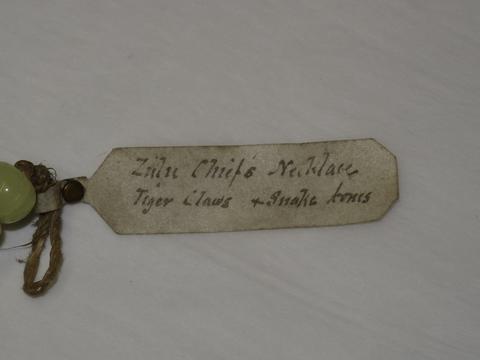Zona do título e menção de responsabilidade
Título próprio
Rectangular parchment label tied to object
Designação geral do material
- Objeto
- Documento textual
Título paralelo
Outra informação do título
Título e menções de responsabilidade
Notas ao título
- Fonte do título próprio: Rachel Hand for MAA
Nível de descrição
Item
Entidade detentora
Código de referência
Zona de edição
Menção de edição
Menção de responsabilidade da edição
Zona de detalhes específicos de materiais
Menção da escala (cartográfica)
Menção da projecção (cartográfica)
Menção das coordenadas (cartográfico)
Menção da escala (arquitectura)
Autoridade emissora e denominação (filatélica)
Zona de datas de criação
Data(s)
-
2016 - (Online curation)
-
YYYY (Making)
Zona de descrição física
Descrição física
Zona dos editores das publicações
Título próprio do recurso continuado
Títulos paralelos das publicações do editor
Outra informação do título das publicações do editor
Menção de responsabilidade relativa ao editor do recurso contínuo
Numeração das publicações do editor
Nota sobre as publicações do editor
Zona da descrição do arquivo
História custodial
[Source - Rachel Hand for MAA, 2016: The Museum’s catalogue cards and labels are part of the institution' and the objects' very history. Catalogue cards were created to add additional object information from the very first accessions back in 1884 and replacement cards were made if the original was lost, usually using both different pens and terms. Original sale or collector labels could be stuck to the cards to add biographical layers of information in the same way that letters and later photographs were sometimes attached to cards. Staff and sometimes visitors would add comments on provenances, measurements and locations over time. Reconnecting an author with their annotations can add to our knowledge of the object’s history and associations. The era and author of the cards also is reflected in their physical aspects: initially details were handwritten in ink, the 1930s saw cards stamped and written on a typewriter, followed variously by handwritten details in ballpoint pen, finally moving to word-processed and laser printed texts.
Like the cards the physical type of paper and pen used can suggest dates as well as authors. They can be used to confirm the identity of misplaced objects, e.g. Henry Bulwer’s collection bears distinctive long, rectangular shaped paper labels and his cursive script.
Early labels were handwritten in ink, on small rectangular paper or parchment label and tied through small metal reinforced holes. Others were glued directly to the object. Smaller rectangular or square paper labels, with a printed outline, usually stuck directly to the object, usually originate in late nineteenth or early twentieth century salerooms or via a collector. Larger circular, metal-edged labels were written in the museum, probably from the 1970s onwards. The 1980s bought larger labels on thick yellow paper, and remained handwritten. From c.2000, we have used acid-free yellowish paper labels, that are written on in light-sensitive and waterproof ink.]
Âmbito e conteúdo
Zona das notas
Condição física
Fonte imediata de aquisição
Organização
Idioma do material
Script do material
Localização de originais
Disponibilidade de outros formatos
Restrições de acesso
Termos que regulam o uso, reprodução e publicação
Creative Commons License: CC BY-NC-ND
https://creativecommons.org/licenses/by-nc-nd/3.0/
Unless otherwise stated the copyright of all material on the FHYA resides with the contributing institution/custodian.
Instrumentos de descrição
Materiais associados
Ingressos adicionais
Nota geral
Accession numbers
[Source - Nessa Leibhammer for FHYA using MAA materials, 2012: Cat ID: 109430; ID NO: 1977.822]
Nota geral
Attributions and conjectures
[Source - MAA, 2012:
Names: Necklace - MAA (01/12/1998)
Classified:
Keyword: Personal Adornment; Ceremonial Objects
Material: Claw; Bone; Glass; Bead
Descriptions: A chief's necklace of tiger claws, snake bones and whitish glass beads. Carries old label with 10/- price on it - MAA (01/12/1998)
Local:
Maker:
Cultural Group: Zulu
Author:
Date Made:
Dimensions:
Source: Haynes, C. B. H. (collector); Haynes, B. (donor)
Source Date:
Place: Africa; Southern Africa; South Africa - MAA (01/12/1998)
Period:
Contexts: Source donated by collector's family per B. Haynes - MAA (01/12/1998)
Updated: 08/05/2014
Created: 01/12/1998]



Material contributed by members of the public
Building an archive is a collective endeavour. Please help us grow the FHYA knowledge base.
If you want to add information to this page you can insert a hyperlink, add files and/or text to the box below.
In the case of material relevant to the FHYA as a whole please upload information HERE.
The FHYA does not vet this material but reserves the right to remove anything deemed to be racist, homophobic, sexist or otherwise offensive. Everything on the FHYA is licensed under a Creative Commons CC BY-NC-ND licence.
To make a contribution you must be a registered user. To register an account, click here. Note that after registration you will not be automatically redirected to this page.
If you have already registered but are not logged in, log in here.